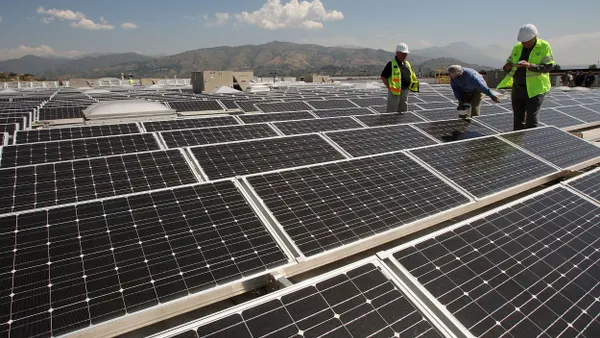Dive Brief:
- NRG Energy is considering a recommendation to sell all of the company's renewable energy assets as it faces pressure from activist investor Paul Singer to cut costs, Bloomberg reports.
- The review could result in the sale of both renewable energy projects developed by NRG and those in NRG Yield. Unnamed sources told the outlet that prospective buyers have expressed interest in purchasing the entire portfolio.
- A sale of NRG's assets could be one of the largest-ever renewable energy transactions, with more than 5 GW of assets in NRG Yield alone.
Dive Insight:
In January, Singer's Elliot Management and Bluescape Energy Partners took an activist stake in NRG, prompting the company to kick off an internal review of its entire business.
The investors, which own 9.4% of the company, want to see it cut costs and improve performance in the face of low power and natural gas prices, which have squeezed profits for its power plant fleet.
That push could lead the company to unload its entire renewable energy portfolio, according to unnamed sources in Bloomberg this week. The company has nearly 5 GW of renewables after buying 1.5 GW from bankrupt SunEdison earlier this year, and the wind and solar assets contribute about a third of its earnings.
Selling its renewable energy portfolio would mark a complete turnaround in the company's strategy in less than two years.
Beginning in 2003, NRG's former CEO David Crane attempted to reshape the fossil-heavy generator into a clean energy superpower, betting big on utility-scale renewables and distributed energy alike.
But NRG's DER business, NRG Home, struggled from the outset to compete with other solar and energy management vendors, and Wall Street investors proved impatient with the transition. Facing a tanking stock price, Crane stepped down in late 2015, leaving current CEO Mauricio Gutierrez to take the reins.
If NRG does move to sell its renewable energy assets, it's unclear what direction the company would take next.
While NRG has a significant portfolio of coal, gas and oil plant assets, those generators are being squeezed by low prices in organized power markets. Earlier this year, Gutierrez told analysts on a conference call that the independent power producer model is "now obsolete and unable to create value over the long term."
Last year, NRG's generation segment lost more than $500 million, alongside its renewables losses of more than $300 million.













